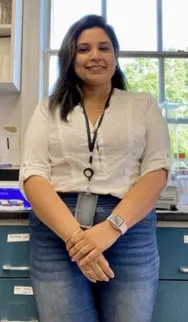ORISE fellow alum recounts her life-changing opportunity with the USDA-ARS
Meet Indrani Kakati Baruah

Indrani Kakati Baruah’s research focused on finding solutions for disease resistance for cacao against pathogens at a molecular and genetic level. (Photo Credit: Indrani Kakati Baruah)
Like many, curiosity was the root of Indrani Kakati Baruah’s, Ph.D., interest in science, technology, engineering and mathematics (STEM) and was always inspired by women pursuing research in STEM field. More specifically, Indrani was curious about how scientific research in the STEM fields were carried out in the U.S.—especially world class federal labs—and wanted to pursue it as a first-generation immigrant woman in STEM from her family in North-East India (NE India). After receiving her doctoral degree in agricultural biotechnology at Assam Agricultural University in Jorhat, Assam, India, she decided to satisfy her curiosity although she was a mother to a young boy. So, she applied to an Oak Ridge Institute for Science and Education (ORISE) opportunity with the mindset that it would be a life changing opportunity. Her motivation behind applying was that if she gets selected, she might be able to influence and inspire young girls in some form from NE India to be strong-willed enough to pursue their dreams despite challenges and never be fearful and always take a chance when one can. Indrani was selected to be a fellow for the United States Department of Agriculture (USDA) Agricultural Research Service (ARS) with the Beltsville Agricultural Research Center (BARC) Sustainable Perennial Crops Lab (SPCL) in Beltsville, Maryland.
The USDA ARS Research Participation Program provides opportunities for students, postgraduates, established scientists and faculty to participate in programs, projects and activities at ARS-designated facilities to help ARS solve agricultural problems of high national priority.
Indrani was tasked with conducting research in a biosafety level two laboratory with various fungal pathogens that were responsible for various devastating diseases on cacao trees, commonly known as the chocolate plant. Her research involved dissecting the molecular interaction between a major deadly fungal pathogen of cacao, Phytophthora palmivora an oomycte which causes black pod rot (BPR) disease in cacao fruit. Cacao is not only important for the chocolate industry, which is a billion-dollar industry, but also for production of other important by-products like cocoa powder and cosmetics.
“P. palmivora pathogenic on cacao occurs wherever the crop is grown around the world causing significant yield losses,” she said. “Cacao is a perennial tropical crop typically grown as a cash crop by farmers with small landholding and the loss in yield can be devastating to livelihoods.”
To find a solution, Indrani examined, in detail, the molecular response of cacao leaves to the P. Palmivora infection at the transcriptome level using several genotypes that show varying levels of tolerance. During examination, the defense responsive transcriptome was outlined allowing for genes that showed differential responses to infection based on the cacao genotype to be identified. Subsequently, additional experiments were conducted using greenhouse grown cacao pods from several cacao genotypes that showed different levels of tolerance verifying defense responsive transcriptome and clarifying unique genotypic responses.
“The purpose of our research was to provide important information related to identifying cacao genes and regulatory elements associated with penetration and post penetration resistance to P. palmivora in leaves and cacao pods respectively as a resource to support future and ongoing efforts to breed P. palmivora resistant cacao.” Additionally, she also collaborated on other projects involving pathogen genomics studies of basidiomycetes Marasmius/Marsamiellus sps. which causes thread blight disease in cacao growing regions of the world.
Indrani believes that credit should be given where credit is due, thanking both Lyndel Meinhardt, Ph.D., and Bryan Bailey, Ph.D., for their support and guidance throughout her research tenure. She expressed Meinhardt’s commitment to ensuring the facilities were up and running all while supporting personnel, especially during Covid-19 when restrictions were in place at the federal sites. Additionally, Bailey’s words of advice that have stayed with Baruah since first being his mentee.
“I am extremely thankful for my mentor Bryan Bailey, Ph.D., who retired just before I finished my tenure as an ORISE fellow at SPCL,” she said. “I tried to embody most of what he taught me during the four and a half years that I was researching under him and learned from him to never put all your eggs in one basket wherein he referred to not focus on one experiment rather involve yourself in many experiments because you never know which might eventually work.”
Indrani provided advice for STEM students, stating to stay focused on project objectives, build good rapport with group leaders and mentors, and to collaborate with many interrelated research teams for further validation of data and increased visibility. Currently, she has six publications from her research with the USDA-ARS and a few under review, two of which being titled, “Transcriptome profiling identifies gene expression patterns and promoter motifs associated with post-penetration resistance to Phytophthora palmivora in pods of Theobroma cacao genotypes” and “Changes in Gene Expression in Leaves of Cacao Genotypes Resistant and Susceptible to Phytophthora palmivora Infection”, which are important findings from her five-year research project.
Indrani is currently on a self-imposed sabbatical visiting family in India after the travel restrictions and personal obligations imposed during her five years as an ORISE fellow that she completed in February this year.
She says, “scientific research needs a lot of patience and diligent effort in the right direction, so be willing to be both and never forget to take periodical breaks. It is essential to strive to have a healthy balance for peak performance in any sphere of life.”
The USDA ARS Research Participation Program is funded by USDA and is administered through the U.S. Department of Energy’s (DOE) Oak Ridge Institute for Science and Education (ORISE). ORISE is managed for DOE by ORAU.

